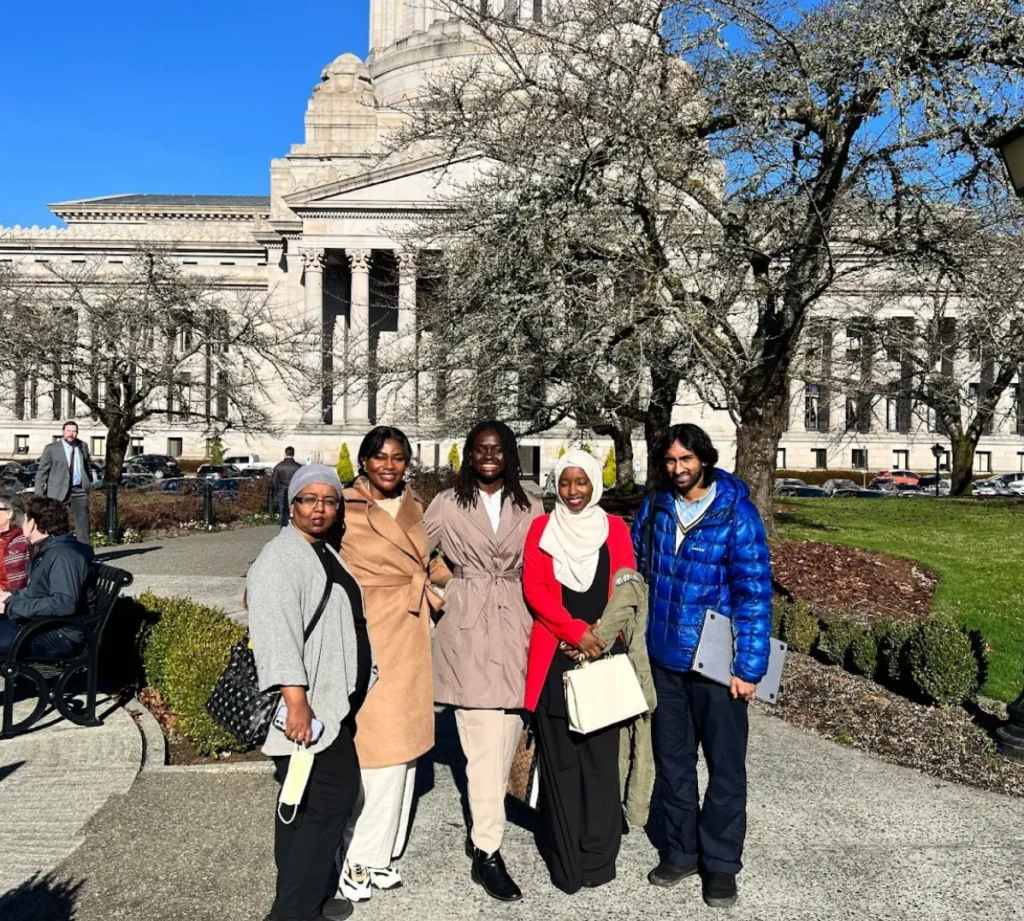After years of work by survivors, activists, advocates, and lawmakers on April 20th, Washington became the 41st state to take a stand against FGM/C
Posted: April 20. 2023
The U.S. End FGM/C Network joins survivors, activists, advocates, and lawmakers in celebrating Washington State becoming the 41st state to take a stand against FGM/C by signing SB 5453 into law on April 20, 2023.
Washington is among the ten US states with the largest population of adults and children vulnerable to FGM/C, with an estimated 25,000 people in the state living with or at risk of FGM/C. Moreover, the Seattle-Tacoma-Bellevue metro area was ranked number five among the metro areas around the country with the highest population of adults and children at-risk or who have undergone FGM/C.
“Passing SB 5453…is a significant victory for the movement to end female genital cutting. The law provides legal protection for survivors and those at risk, enabling them to access essential support and care” said Absa Samba, a survivor of FGM/C and co-founder of the Washington Coalition To End FGM/C. “This bill is long overdue, and I feel proud to see Washington state join the 40 other states that have acted to end this practice”
Absa became involved with the issue as part of a school project when her research connected her to State Senator Karen Keiser, who became the bill’s primary sponsor.
“Female genital mutilation is an extreme form of gender based violence that is unfortunately still practiced in our state” Senator Keiser said in remarks earlier this year “…We have to make sure Washington does not become a haven for this practice.”
Previously, Washington was the only state among its neighbors that did not have a law to address FGM/C, making the state vulnerable to increased instances of FGM/C.
The bill, SB 5453, passed unanimously in Washington’s State Senate in March, before going on to pass the Washington House of Representatives in a 95–1 vote. The law bans the practice of FGM/C on any person in Washington under the age of 18, and imposes a prison term up to 10 years and a fine of up to $10,000. It also does not allow for religion, culture or a victim or their parent’s consent to FGM/C to be used as a defense.
Bettina S. Duncan, Professor of Anthropology at the University of Washington, spoke of the importance of legislation as a tool for change, especially when that legislation provides for outreach and education.”When families and community members deliberate upon whether a girl should undergo FGM, knowledge of the law strengthens the power of persuasion of those who no longer endorse this practice.”
Dr. Stephen Blanford, Executive Director of Children’s Alliance, a statewide nonpartisan advocacy organization for children in Washington state, said [We’re] honored to have had the opportunity to work alongside an incredible team of FGM/C survivors and advocates to pass this critically important legislation. Washington state was a laggard in providing protections against this practice; our state’s children and youth will greatly benefit from the work of this coalition.”
The bill’s passage is part of a longstanding effort to see Washington address FGM/C, including a 2019 change.org petition started by Abid and Maryum Saifee that gained over 170,000 signatures.
In 2022, Absa and other activists reached out to their counterparts in the Connecticut Coalition To End FGM/C to learn about the ways that an alliance between survivors, activists, and allies could come together in Washington. Eventually, they would form the Washington Coalition to End FGM/C, a group of survivors, community organizations, legislators, advocates and others, to educate people about the need for policy solutions to address FGM/C in Washington.
“[We] centered the voices and desires of communities and individuals affected by FGM/C” said Absa. “The collaborative work of our coalition that led to passing of SB 5453 in Washington can serve as a model for the nine other states that have yet to act against FGM/C.”
“The power of the collective work and collaboration of the coalition members and affected communities is living example of the power of community engagement/ involvement the representation…” says Dr. Muna Osman, founder of the Holistic Family Care Clinic in Auburn, Washington, and a member of the Washington Coalition To End FGM/C.
But, she says, the coalition’s work is not yet over., Now that SB 5453 has been signed into law, it’s now time for the bulk of the work to begin — because a law is just the first step in a long process to ensure those vulnerable to FGM/C in Washington are protected, and that survivors of FGM/C can access justice.
“The goal” says Muna, “ is to make sure appropriate pathways and educational programs and materials are developed to meet these communities’ needs, are culturally sensitive and will maintain families well being and promote healing, and are accessible to parents, children, and professionals.”
The US End FGM/C Network will be working with the Washington State Department of Health to ensure a culturally responsive and effective education and outreach campaign is implemented according to the terms set out in the new law.
“This [is] an opportunity for a much-needed conversation and education on FGM/C in our communities” said Samba. “It is a critical step towards advancing gender equity and human rights while safeguarding future generations from this harmful practice.”
For more information, read the statement that The U.S. End FGM/C Network released in partnership with Equality Now, Sahiyo U.S., and the Washington Coalition to End FGM/C.

